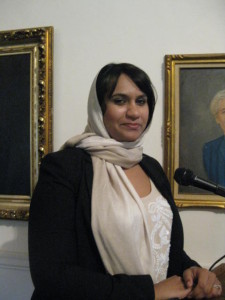The True Islamic State: What ISIS, The Taliban, Al-Qaida, and Boko Haram Got All Wrong

On Thursday, Nov. 6, Maya Khalid-Janney visited campus along with her father Akram Khalid to give a lecture titled “The True Islamic State: What ISIS, the Taliban, Al-Qaida, and Boko Haram Got All Wrong.”
The lecture discussed the true beliefs of Islam versus what the media has reported about certain terrorist organizations.
Khalid-Janney has a Masters of Science in Psychology from Shippensburg University and a Doctorate of Psychology in Applied Clinical Psychology from the Chicago School of Professional Psychology.
The purpose of this lecture was not to project political views about what is happening in the Islamic world but to promote awareness of the religion itself and the skewed perspectives society has due to misrepresentations in the media.
Khalid-Janney explains that for the true state of Islam, the first constitution appeared in the State of Medina when Muslims, Jews, and Christians all sought freedom from the religious persecution of Mecca.
Its objectives were to promote peace and cooperation, justice, freedom of religion, and protection of property.
This multi-religious society is similar to the one in the United States today. In fact, the United States Lockian principles that helped influence the United States Constitution parallel the ideas of Medina.
Khalid-Janney says that Muslims have gone through a dark age, as most are not able to read the religious texts, and she advocates for education and awareness.
The lack of education is not the only problem when interpreting religious texts. Some of the words and terms are ambiguous to a point where translations may differ. Many extremist groups take ideas out of context and twist their meanings to fit political agendas and cause many misunderstandings of the true meanings of religious teachings.
Reverend Rosie Magee, Wilson’s Helen Carnell Eden Chaplain, was excited to see students getting involved in current issues by attending the lecture and was also pleased to see a large turnout from the Chambersburg community. She hopes that the lecture was informative and gave people a chance to experience the religion without the influence of media commentary.
Like Khalid-Janney, she too advocates for education and awareness pertaining to the subject.
Magee also hopes that from this experience students will learn to look beyond headlines and what the media presents as “news worthy.”
Magee plans to have Khalid-Janney back again for more lectures to give more information and spread education and awareness about the future of Islam.
